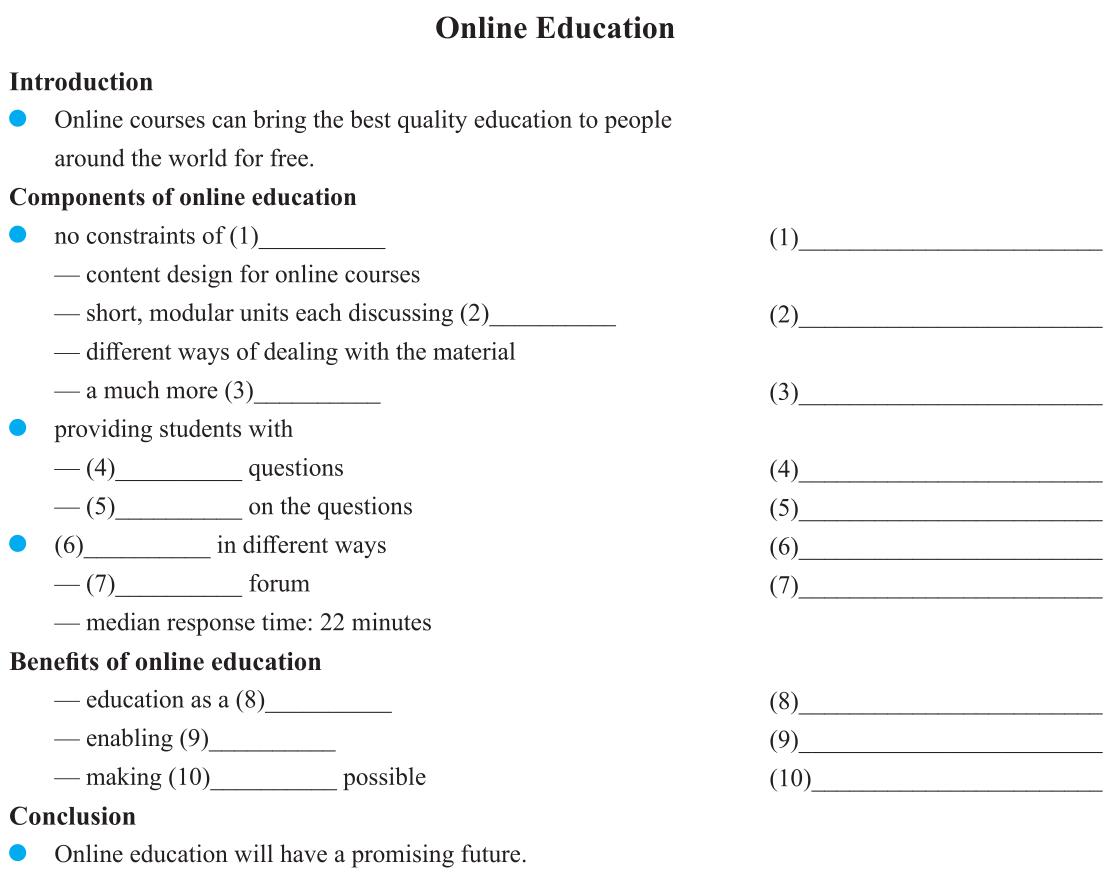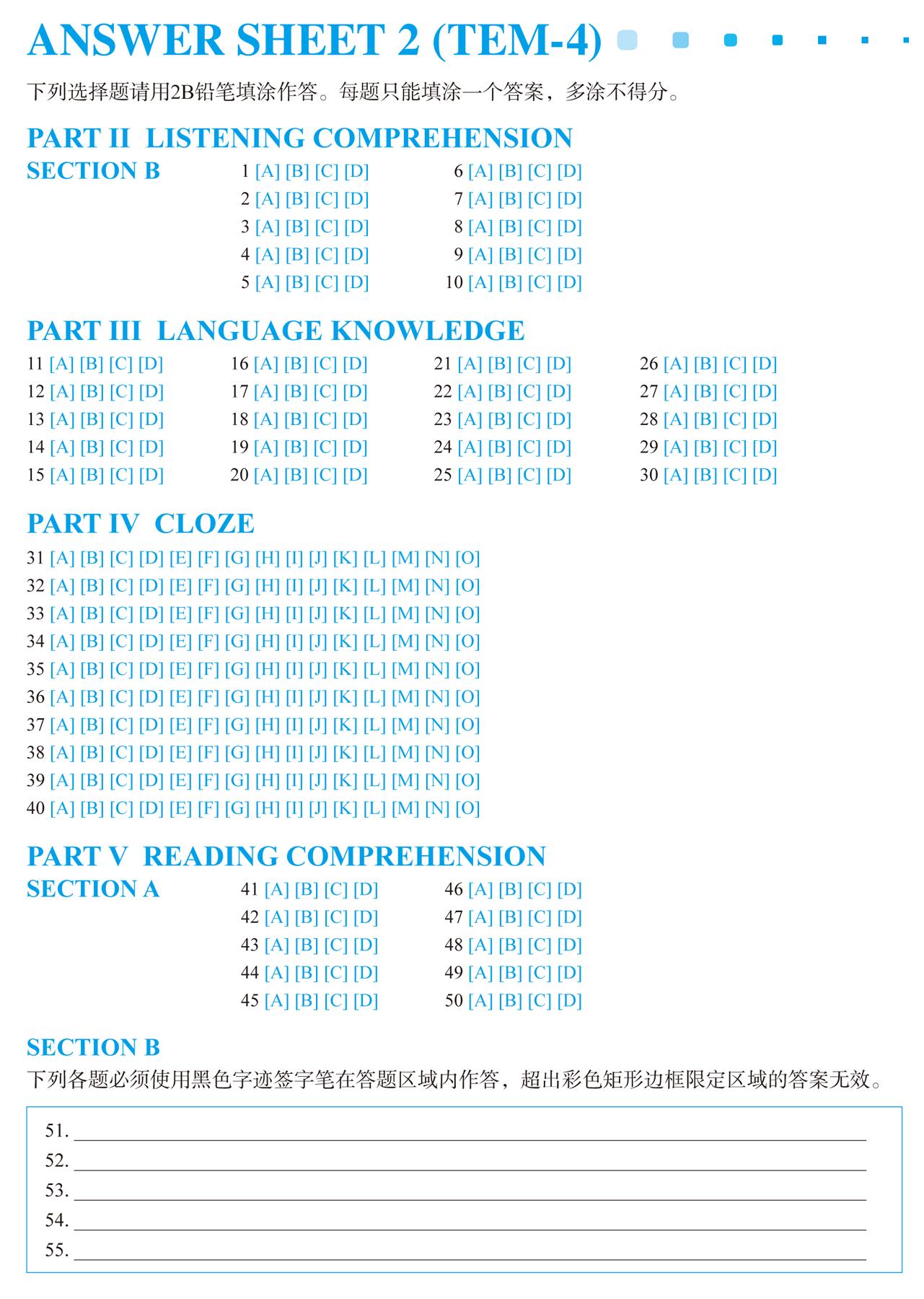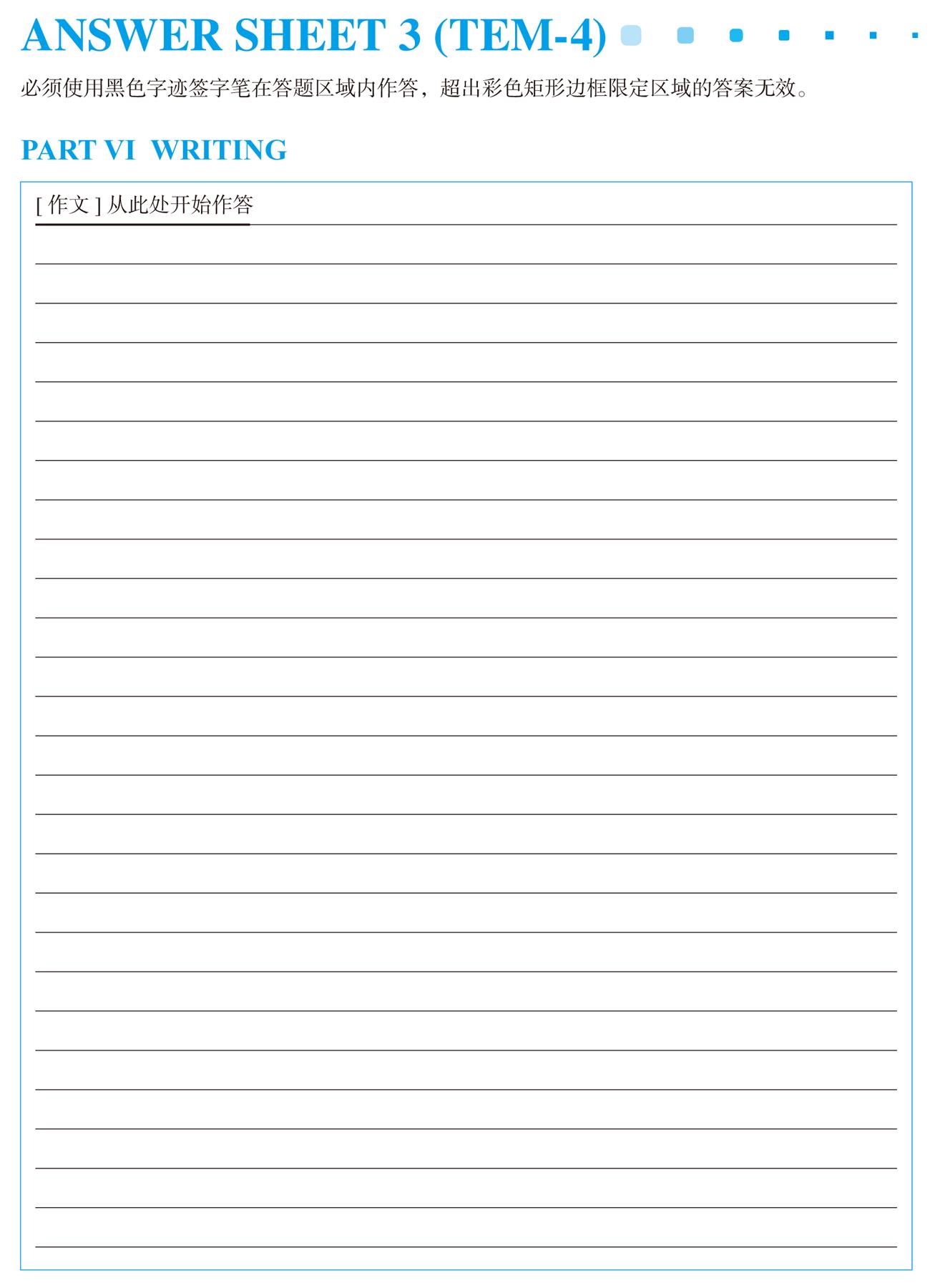




 TEST FOR ENGLISH MAJORS (2017)
TEST FOR ENGLISH MAJORS (2017)
TIME LIMIT: 130 MIN

扫码听音频
Listen to the following passage.Altogether the passage will be read to you four times.During the first reading, which will be done at normal speed, listen and try to understand the meaning.For the second and third readings, the passage will be read sentence by sentence, or phrase by phrase, with intervals of 15 seconds.The last reading will be done at normal speed again and during this time you should check your work.You will then be given ONE minute to check through your work once more.
Please write the whole passage on ANSWER SHEET ONE.
In this section you will hear a talk.You will hear the talk ONCE ONLY.While listening, you may look at the task on ANSWER SHEET ONE and write NO MORE THAN THREE WORDS for each gap.Make sure what you fill in is both grammatically and semantically acceptable.You may use the blank sheet for note-taking.
You have THIRTY seconds to preview the gap-filling task.
Now listen to the talk.When it is over, you will be given TWO minutes to check your work.
In this section you will hear two conversations.At the end of each conversation, five questions will be asked about what was said.Both the conversations and the questions will be spoken ONCE ONLY.After each question there will be a ten-second pause.During the pause, you should read the four choices of A, B, C and D, and mark the best answer to each question on ANSWER SHEET TWO.
You have THIRTY seconds to preview the choices.
Now, listen to the conversations.
Questions 1 to 5 are based on Conversation One.
1.A.It has wiped the data from the flash drive.
B.It can't read data from the flash drive.
C.The files stored in it have got lost.
D.The files in it can't be opened.
2.A.Get a total refund.
B.Get a partial refund.
C.Get a new computer.
D.Get a new hard disk.
3.A.Indifferent.
B.Surprised.
C.Anxious.
D.Dissatisfied.
4.A.By 8:30 tomorrow morning.
B.After 8:30 tomorrow morning.
C.At 8:30 this evening.
D.Anytime tomorrow.
5.A.6574-3205.
B.6547-2305.
C.6457-2035.
D.6475-3025.
Questions 6 to 10 are based on Conversation Two.
6.A.Hold a party at home.
B.Introduce ourselves first.
C.Avoid meeting them.
D.Wait for them to visit us.
7.A.Do nothing about it.
B.Tell him to stop.
C.Give him a reason to stop.
D.Call the police immediately.
8.A.Try to be patient.
B.Try to be sympathetic.
C.Don't appear to be friendly.
D.Don't answer their questions.
9.A.No more than five minutes.
B.Five to ten minutes.
C.About half an hour.
D.About an hour.
10.A.Family Circle Magazine.
B.Morning radio programs.
C.Betty's website.
D.CBS news website.
There are twenty sentences in this section.Beneath each sentence there are four words or phrases marked A, B, C and D.Choose one word or phrase that best completes the sentence.Mark your answers on ANSWER SHEET TWO.
11._______ combination of techniques authors use, all stories—from the briefest anecdotes to the longest novels—have a plot.
A.Regarding
B.Whatever
C.In so far as
D.No matter
12.She followed the receptionist down a luxurious corridor to a closed door,_______ the woman gave a quick knock before opening it.
A.on which
B.but when
C.wherein
D.then
13.Ms.Ennab is one of the first Palestinian_______ with seven years' racing experience.
A.woman drivers
B.women driver
C.women drivers
D.woman driver
14.“I wondered if I could have a word with you.” The past tense used in the sentence refers to a_______.
A.past event for exact time reference
B.present event for tentativeness
C.present event for uncertainty
D.past event for politeness
15.“If I were you, I wouldn't wait to propose to her.” The subjunctive mood in the sentence is used to_______.
A.alleviate hostility
B.express unfavorable feelings
C.indicate uncertainty
D.make a suggestion
16.“It's a shame that the city official should have gone back on his word.” The modal auxiliary SHOULD express_______.
A.obligation
B.disappointment
C.future in the past
D.tentativeness
17.Timothy Ray Brown, the first man cured of HIV, initially opted against the stem cell transplant that_______ history.
A.could have later made
B.should have made later
C.might make later
D.would later make
18.Some Martian rock structures look strikingly like structures on Earth that are known_______ by microbes.
A.having been created
B.being created
C.to have been created
D.to be created
19.At that moment, with the crowd watching me, I was not afraid in the ordinary sense, as I_______ if I_______ alone.
A.would have been…had been
B.should be…had been
C.could be…were
D.might have been…were
20.You must fire_______ incompetent assistant of yours.
A.the
B.an
C.that
D.whichever
21.Some narratives seem more like plays, heavy with dialogue by which writers allow their_______ to reveal themselves.
A.charisma
B.characters
C.characteristics
D.characterizations
22.If you intend to melt the snow for drinking water, you can_______ extra purity by running it through a coffee filter.
A.assure
B.insure
C.reassure
D.ensure
23.The daisy-like flowers of chamomile have been used for centuries to_______ anxiety and insomnia.
A.decline
B.relieve
C.quench
D.suppress
24.Despite concern about the disappearance of the album in popular music, 2014 delivered a great crop of album_______.
A.releases
B.appearances
C.publications
D.presentations
25.The party's reduced vote in the general election was_______ of lack of support for its policies.
A.revealing
B.confirming
C.indicative
D.evident
26.He closed his eyes and held the two versions of La Mappa to his mind's_______ to analyze their differences.
A.vision
B.eye
C.view
D.sight
27.Twelve pupils were killed and five_______ injured after gunmen attacked the school during lunchtime.
A.critically
B.enormously
C.greatly
D.hard
28.A 15-year-old girl has been arrested_______ accusations of using Instagram to anonymously threaten her high school.
A.over
B.with
C.on
D.for
29.It was reported that a 73-year-old man died on an Etihad flight_______ to Germany from Abu Dhabi.
A.bounded
B.binded
C.boundary
D.bound
30.It's_______ the case in the region; a story always sounds clear enough at a distance, but the nearer you get to the scene of events the vaguer it becomes.
A.invariably
B.immovably
C.unalterably
D.unchangeably
Decide which of the words given in the box below would best complete the passage if inserted in the corresponding blank.The words can be used ONCE ONLY.Mark the letter for each word on ANSWER SHEET TWO.
A.always B.barely C.demise D.emergence E.gained F.implications G.leaf H.lost I.naturally J.object K.one L.online M.rising N.single O.value
Millions of people now rent their movies the Netflix way.They fill out a wish list from the 50,009 titles on the company's web site and receive the first few DVD's in the mail; when they mail each one back, the next one on the list is sent.The Netflix model has been exhaustively analyzed for its disruptive, new-economy (31)______.What will it mean for video stores like Blockbuster? What will it mean for movie studios and theaters? What does it show about “long tail” businesses—ones that combine many markets into a (32)______ target audience? But one other major implication has (33)______ been mentioned: what this and similar Internet-based businesses mean for the United States Postal Service.
Every day, some two million Netflix envelopes come and go as firstclass mail.They are joined by millions of other shipments from (34)______ pharmacies, eBay vendors, Amazon.com and other businesses that did not exist before the Internet.
The (35)______ of “snail mail” in the age of electronic communication has been predicted at least as often as the coming of the paperless office.But the consumption of paper keeps (36)______.It has roughly doubled since 1980.On average, an American household receives twice as many pieces of mail a day as it did in the 1970’s.
The harmful side of the Internet's impact is obvious but statistically less important than many would guess.People (37)______ write fewer letters when they can send e-mail messages.To (38)______ through a box of old paper correspondence is to know what has been (39)______ in this shift: the pretty stamps, the varying look and feel of handwritten and typed correspondence, the tangible (40)______ that was once in the sender's hands.
In this section there are three passages followed by ten multiple choice questions.For each multiple choice question, there are four suggested answers marked A, B, C and D.Choose the one that you think is the best answer and mark your answers on ANSWER SHEET TWO.
(1) When I was a young girl living in Ireland, I was always pleased when it rained, because that meant I could go treasure hunting.What's the connection between a wet day and a search for buried treasure? Well, it's quite simple.Ireland, as some of you may already know, is the home of Leprechauns—little men who possess magic powers and, perhaps more interestingly, pots of gold.
(2) Now, although Leprechauns are interesting characters, I have to admit that I was more interested in the stories of their treasure hoard. This , as all of Ireland knows, they hide at the end of the rainbow.Leprechauns can be fearsome folk but if you can discover the end of the rainbow, they have to unwillingly surrender their gold to you.So whenever it rained, I would look up in the sky and follow the curve of the rainbow to see where it ended.I never did unearth any treasure, but I did spend many happy, showery days dreaming of what I could do with the fortune if I found it.
(3) As I got older, and started working, rainy days came to be just another nuisance and my childhood dreams of finding treasure faded.But for some people the dream of striking it lucky never fades, and for a fortunate few, the dream even comes true! Such is the case of Mel Fisher.His dream of finding treasure also began in childhood, while reading the great literature classics “Treasure Island” and “Moby Dick”.However, unlike me, he chased his dream and in the end managed to become one of the most famous professional treasure hunters of all time, and for good reason.In 1985, he fished up the priceless cargo of the sunken Spanish ship Atocha, which netted him an incredible $400 million dollars!
(4) After the ship sank in 1622 off the coast of Florida,its murky waters became a treasure-trove(埋藏的宝藏)of precious stones,gold bars and silver coins known as “pieces of eight”.The aptly-named Fisher, who ran a commercial salvaging operation, had been trying to locate the underwater treasure for over 16 years when he finally hit the jackpot ! His dreams had come true but finding and keeping the treasure wasn't all plain sailing.After battling with hostile conditions at sea, Fisher then had to battle in the courts.In fact, the State of Florida took Fisher to court over ownership of the find and the Federal government soon followed suit.After more than 200 hearings, Fisher agreed to donate 20% of his findings for public display, and so now there is a museum in Florida which displays hundreds of the objects which were salvaged from the Atocha.
(5) This true story seems like a modern-day fairytale: a man pursues his dream through hardship and in the end, he triumphs over the difficulties—they all live happily ever after, right? Well, not exactly.Archaeologists object to the fact that with commercial salvaging operations like Fisher's,the objects are sold and dispersed and UNESCO are also worried about protecting our underwater heritage from what it describes as “pillaging”(抢劫、掠夺).
(6) The counter-argument is that in professional, well-run operations such as Fisher's, each piece is accurately and minutely recorded and that it is this information which is more important than the actual object, and that such operations help increase our wealth of archaeological knowledge.Indeed, as in Fisher's case, they make history more accessible to people through museum donations and information on web sites.
(7) The distinction of whether these treasure hunters are salvaging or pillaging our underwater heritage may not be clear, but what is clear is that treasure hunting is not just innocent child's play anymore but profitable big business.I have learnt that the end of the rainbow is beyond my reach, but in consolation, with just a click of the mouse, I too can have a share in the riches that the Atocha has revealed.As Friedrich Nietzsche so wisely said: “Our treasure lies in the beehive of our knowledge.”
41.In Para.4, the phrase “ hit the jackpot ” means_______ according to the context.
A.discovered the jackpot
B.found the treasure
C.broke one of the objects
D.ran a salvaging operation
42.It can be concluded from Paras.5 and 6 that_______.
A.UNESCO's view is different from archaeologists’
B.all salvaging operations should be prohibited
C.attention should be paid to the find's educational value
D.people hold entirely different views on the issue
43.How did the author feel about the treasure from the Atocha (Para.7)?
A.She was glad that people can have a chance to see the treasure.
B.She was sad that she was unable to discover and salvage treasure.
C.She was angry that treasure hunters were pillaging heritage.
D.She was unconcerned about where the treasure came from.
(1) Paul was dissatisfied with himself and with everything.The deepest of his love belonged to his mother.When he felt he had hurt her, or wounded his love for her, he could not bear it.Now it was spring and there was battle between him and Miriam, his girlfriend.This year he had a good deal against her.She was vaguely aware of it.The old feeling that she was to be sacrifice to this love, which she had had when she prayed, was mingled in all her emotions.She did not at the bottom believe she ever would have him.She did not believe in herself primarily: doubted whether she could ever be what he would demand of her.Certainly she never saw herself living happily through a lifetime with him.She saw tragedy, sorrow, and sacrifice ahead.And in sacrifice she was proud, in renunciation she was strong, for she did not trust herself to support everyday life.She was prepared for the big things and the deep things, like tragedy.It was the sufficiency of the small day-life she could not trust.
(2) The Easter holidays began happily.Paul was his own frank self.Yet she felt it would go wrong.On the Sunday afternoon she stood at her bedroom window, looking across at the oak-trees of the wood, in whose branches a twilight was tangled, below the bright sky of the afternoon.Grey-green rosettes of honeysuckle leaves hung before the window, some already, she fancied, showing bud.It was spring, which she loved and dreaded.
(3) Hearing the clack of the gate she stood in suspense.It was a bright grey day.Paul came into the yard with his bicycle, which glittered as he walked.Usually he rang his bell and laughed towards the house.Today he walked with shut lips and cold, cruel bearing, that had something of a slouch and a sneer in it.She knew him well by now, and could tell from that keen-looking what was happening inside him.There was a cold correctness in the way he put his bicycle in its place, that made her heart sink.
(4) She came downstairs nervously.She was wearing a new net blouse that she thought became her.It had a high collar with a tiny ruff, making her, she thought, look wonderfully a woman, and dignified.At twenty she was full-breasted and luxuriously formed.Her face was still like a soft rich mask, unchangeable.But her eyes, once lifted, were wonderful.She was afraid of him.He would notice her new blouse.
(5) He, being in a hard, ironical mood, was entertaining the family to a description of a service given in the Primitive Methodist Chapel.He sat at the head of the table, his mobile face, with the eyes that could be so beautiful, shining with tenderness or dancing with laughter, now taking on one expression and then another, in imitation of various people he was mocking.His mockery always hurt her; it was too near the reality.He was too clever and cruel.She felt that when his eyes were like this, hard with mocking hate, he would spare neither himself nor anybody else.But Miriam's mother was wiping her eyes with laughter, and her father, just awake from his Sunday nap, was rubbing his head in amusement.The three brothers sat with ruffled, sleepy appearance in their shirt-sleeves, giving a guffaw from time to time.The whole family loved a “take-off” more than anything.
44.It can be learned from the beginning that Miriam's attitude towards love between her and Paul is________.
A.indifferent
B.desperate
C.pessimistic
D.ambiguous
45.The narration in Para.3 tells us that Miriam had all the following feelings EXCEPT_______.
A.delight
B.expectation
C.uncertainty
D.foreboding
46.Which of the following statements is CORRECT about the family's response to Paul's mockery?
A.Only the parents found it entertaining.
B.Every member except Mariam was amused.
C.The brothers found it hard to appreciate.
D.Miriam also thought it was amusing.
(1) I've written this article and you're reading it.So we are members of the same club.We're both literate—we can read and write.And we both probably feel that literacy is essential to our lives.But millions of people all over the world are illiterate.Even in industrialised Western countries, such as the UK and the USA, approximately 20% of the population have “low literacy levels”.But what exactly does that mean?
(2) My parents both left school at 14.They could read and write, but except for a quick look at the daily newspaper, reading and writing didn't play a big part in their lives.There were very few books in the house.My mother was amazed because the woman who lived next door always wrote a list of what she needed before she went to the supermarket.Why couldn't she remember? We laughed about that for weeks.Our family didn't write lists! And when I was only 14 years old my father gave me an important letter that he'd written to the bank and asked me to check it for grammar and spelling mistakes.And there were quite a lot.He never usually wrote letters or postcards or even Christmas cards.So when he had to write he wasn't comfortable or confident.Does that mean that my father had a “low level of literacy”? I don't think so.
(3) There are lots of different definitions of literacy.Some experts define it as having the reading and writing skills that you need to be independent in your everyday life.So, for example, if you can read instructions, write a cheque, fill in a form,—anything that you need to do in everyday life—then you are “functionally literate”.
(4) Other people say that you are illiterate if you think that you are illiterate.In other words, if you feel that you can't read or write as well as you would like to.
(5) If you live in a society where most people are literate, then you will feel ashamed or embarrassed and avoid situations in which you have to read or write.The father of a friend of mine finally admitted to his family that he couldn't read when he was 45 years old.He bought the newspaper every day and pretended to read it—and believe it or not, his family had no idea.
(6) We often forget that writing is a recent invention.Many years ago, the word “literate” meant being able to communicate well in speaking, in other words what we now call “articulate”.Story telling was an important activity in the past and still is today in some societies.Reading was often a co-operative activity—someone would read aloud to a group, often from a religious text such as the Koran or the Bible.
(7) Only a hundred years ago, in the United States, you were considered to be literate if you could sign your name to a piece of paper.It was an important skill.You were not allowed to vote if you couldn't sign the voting register, so literacy was connected with political rights, and many people were excluded from the democratic process.
(8) Nowadays we see reading and writing as being connected, but that wasn't so in the past.Many people could read, but not write.Writing was a skilled profession.If you needed something written then you paid an expert to write it for you.
(9) And of course, rich and important people have always employed people to write things for them.Important company bosses dictated letters to their secretaries or personal assistants.And now with new computer software you can dictate directly to your computer.
(10) Being illiterate can have a big effect on people's lives.For example, a study in the UK showed that people who write and spell badly are seen as careless, immature and unreliable, and often unintelligent.So it is more difficult for them to find jobs, even when reading and writing are not necessary for the work.
(11) World-wide statistics show that literacy problems are associated with poverty and a lack of political power.More women than men are illiterate.Illiterate people have worse health, bigger families and are more likely to go to prison.So literacy campaigns must be a good thing.But don't forget that an illiterate person, or someone with a low level of literacy, isn't necessarily stupid or ignorant, and may not be unhappy at all. Knowledge and wisdom isn't only found in writing.
47.Why does the author give two examples in Para.2?
A.To show that literacy is interpreted in different ways.
B.To show that Father was more literate than Mother.
C.To indicate how important reading and writing are.
D.To compare the level of literacy between neighbours.
48.According to the author, the following are some of the defining features of literacy EXCEPT________.
A.psychological
B.functional
C.social
D.independent
49.Which of the following statements about reading and writing is CORRECT?
A.Reading and writing have always been regarded as equally difficult.
B.People had to read and write well in order to be allowed to vote.
C.Reading often requires more immediate interaction than writing.
D.Reading and writing have always been viewed as being connected.
50.What do the last two paragraphs mainly focus on (Paras.10 and 11)?
A.Effects of illiteracy and employment problems.
B.Effects of illiteracy and associated problems.
C.Effects of illiteracy on one's personality development.
D.Effects of illiteracy on women's career development.
In this section there are five short answer questions based on the passages in Section A.Answer the questions with NO MORE THAN TEN WORDS in the space provided on ANSWER SHEET TWO.
51.What does This in Para.2 refer to?
52.Why did Fisher have to battle in the courts after he found the treasure (Para.4)?
53.Why did Miriam wear a new net blouse on Sunday afternoon?
54.What is the meaning of the sentence “…he would spare neither himself nor anybody else” in Para.5?
55.Explain the meaning of the last sentence of Para.11 according to the context.
Read carefully the following excerpt and then write your response in NO LESS THAN 200 WORDS, in which you should:
1) summarize the main message of the excerpt, and then
2) comment on whether our brains will get lazy in a world run by intelligent machines
You can support yourself with information from the excerpt.
Marks will be awarded for content relevance, content sufficiency, organization and language quality.Failure to follow the above instructions may result in a loss of marks.
Write your response on ANSWER SHEET THREE.
Changing technology stimulates the brain and increases intelligence.But that may only be true if the technology challenges us.In a world run by intelligent machines, our lives could get a lot simpler.Would that make us less intelligent?
Artificial intelligence is taking over many human jobs.For instance, planes are being flown much of the time by automatic pilots.And the complex problem of controlling air traffic around large modern airports is also achieved by artificial intelligence that operates well beyond the capability of mere human air traffic controllers.
Artificial intelligence is embedded in many features of modern life for the simple reason that intelligent machines can already outperform humans, including some aptitudes where there was once thought to be a human advantage, such as playing chess, and writing poetry, or even novels.
As machines get smarter, they will do more of our thinking for us and make life easier.In the future, the electronic assistant will develop to the point that it serves similar functions as a real living butler, fulfilling requests such as: “Organize a dinner party for six on Thursday, Jeeves, and invite the usual guests.”
At that point, our long struggle with challenging technologies is at an end.Like Bertie Wooster, we can take it easy knowing that the hard work of planning and organizing is being done by a better brain—the electronic assistant.Starved of mental effort, our brains will regress.
THE END ■ ■ ■ ■
必须使用黑色字迹签字笔在答题区域内作答,超出彩色矩形边框限定区域的答案无效。
[听写] 从此处开始作答________________________


